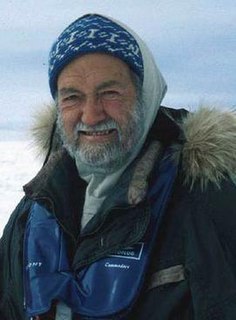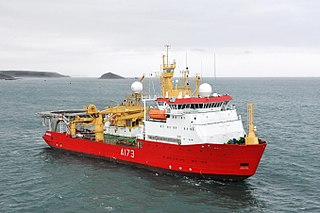
The North Pole, also known as the Geographic North Pole or Terrestrial North Pole, is the point in the Northern Hemisphere where the Earth's axis of rotation meets its surface. It is called the True North Pole to distinguish from the Magnetic North Pole.

The history of Antarctica emerges from early Western theories of a vast continent, known as Terra Australis, believed to exist in the far south of the globe. The term Antarctic, referring to the opposite of the Arctic Circle, was coined by Marinus of Tyre in the 2nd century AD.

Sir Ernest Henry Shackleton was an Anglo-Irish Antarctic explorer who led three British expeditions to the Antarctic. He was one of the principal figures of the period known as the Heroic Age of Antarctic Exploration.

Albert Paddock Crary, was a pioneer polar geophysicist and glaciologist. He was the first person to have set foot on both the North and South Poles, having made it to the North Pole on May 3, 1952 and then to the South Pole on February 12, 1961, as the leader of a team of eight. The South Pole expedition set out from McMurdo Station on December 10, 1960, using three Snowcats with trailers. Crary was the seventh expedition leader to arrive at the South Pole by surface transportation. He was widely admired for his intellect, wit, skills and as a great administrator for polar research expeditions.

Elephant Island is an ice-covered, mountainous island off the coast of Antarctica in the outer reaches of the South Shetland Islands, in the Southern Ocean. The island is situated 245 kilometres north-northeast of the tip of the Antarctic Peninsula, 1,253 kilometres west-southwest of South Georgia, 935 kilometres south of the Falkland Islands, and 885 kilometres southeast of Cape Horn. It is within the Antarctic claims of Argentina, Chile and the United Kingdom.

The Imperial Trans-Antarctic expedition of 1914–1917 is considered to be the last major expedition of the Heroic Age of Antarctic Exploration. Conceived by Sir Ernest Shackleton, the expedition was an attempt to make the first land crossing of the Antarctic continent. After Roald Amundsen's South Pole expedition in 1911, this crossing remained, in Shackleton's words, the "one great main object of Antarctic journeyings". Shackleton's expedition failed to accomplish this objective, but became recognized instead as an epic feat of endurance.

The Scott Polar Research Institute (SPRI) is a centre for research into the polar regions and glaciology worldwide. It is a sub-department of the Department of Geography in the University of Cambridge, located on Lensfield Road in the south of Cambridge.

Sir Walter William Herbert was a British polar explorer, writer and artist. In 1969 he became the first man fully recognized for walking to the North Pole, on the 60th anniversary of Robert Peary's disputed expedition. He was described by Sir Ranulph Fiennes as "the greatest polar explorer of our time".

Multiple governments have set up permanent research stations in Antarctica and these bases are widely distributed. Unlike the drifting ice stations set up in the Arctic, the Research stations of the Antarctic are constructed either on rock or on ice that is fixed in place.

Sir James Mann Wordie CBE Fellow of the Royal Society PRGS FRSGS LLD was a Scottish polar explorer and geologist. Friends knew him as Jock Wordie.
The British Antarctic Survey (BAS) is the United Kingdom's national polar research institute. It has a dual purpose, to conduct polar science, enabling better understanding of global issues, and to provide an active presence in the Antarctic on behalf of the UK. It is part of the Natural Environment Research Council (NERC). With over 400 staff, BAS takes an active role in Antarctic affairs, operating five research stations, one ship and five aircraft in both polar regions, as well as addressing key global and regional issues. This involves joint research projects with over 40 UK universities and more than 120 national and international collaborations.

Sir James Clark Ross was a British Royal Navy officer and polar explorer known for his explorations of the Arctic, participating in two expeditions led by his uncle Sir John Ross, and four led by Sir William Parry, and, in particular, for his own Antarctic expedition from 1839 to 1843.
Rupert Nigel Pendrill Hadow known as Pen Hadow, is an Arctic region explorer, advocate, adventurer and guide. He is the only person to have trekked solo, and without resupply by third parties, from Canada to the Geographic North Pole.

Farthest North describes the most northerly latitude reached by explorers, before the first successful expedition to the North Pole rendered the expression obsolete. The Arctic polar regions are much more accessible than those of the Antarctic, as continental land masses extend to high latitudes and sea voyages to the regions are relatively short.
Huw Lewis-Jones is a British historian, editor, broadcaster and art director. Formerly a historian and Curator of Art at the Scott Polar Research Institute, University of Cambridge, Lewis-Jones left Cambridge in June 2010 to pursue book and broadcasting projects. He is the Editorial Director of the independent publishing company Polarworld.

HMS Protector is a Royal Navy ice patrol ship built in Norway in mid 2000. As MV Polarbjørn she operated under charter as a polar research icebreaker and a subsea support vessel. In 2011, she was chartered as a temporary replacement for the ice patrol ship HMS Endurance and was purchased by the British Ministry of Defence in early September 2013. As DNV Ice Class 05 the vessel can handle first year ice up to 0.5 metres (20 in).
Students on Ice Foundation is a Canadian charitable organisation that leads educational expeditions to the Arctic and Antarctic for international high school and university students. Its mandate is to provide youth, educators and scientists from around the world with learning and teaching opportunities in the polar regions, with the goal of fostering an understanding of, and commitment to building a more sustainable future.

Timothy McCarthy was an Irish able seaman (AB). He is best known for his service in the Imperial Trans-Antarctic Expedition of 1914–1916, for which he was awarded the Bronze Polar Medal.












